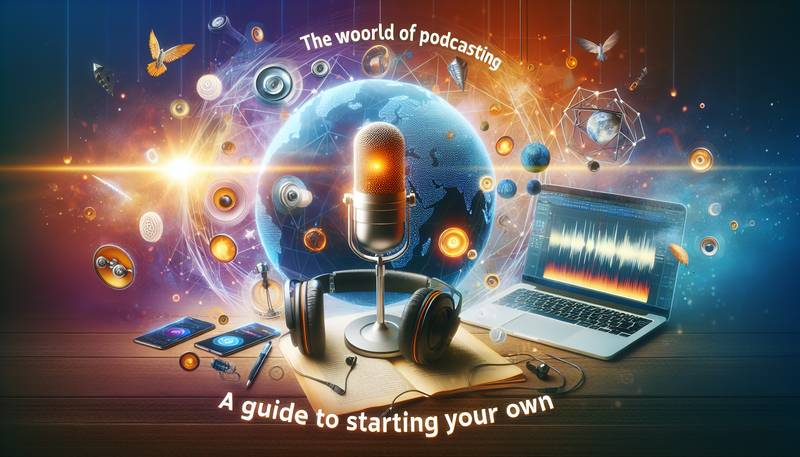The World of Podcasting: A Guide to Starting Your Own

Podcasting has taken the world by storm in recent years, and for good reason. This increasingly popular form of media offers a unique and intimate way for content creators to connect with their audience. Whether you're interested in sharing your thoughts on the latest movies, discussing political issues, or educating listeners on a particular topic, starting a podcast can be a fulfilling and potentially profitable venture. But where do you even begin? In this comprehensive guide, we'll walk you through the steps to launching your own successful podcast.
Understanding the Podcasting Landscape
Before diving into the technical aspects of starting a podcast, it's essential to understand the current state of the podcasting world. As of 2021, there are over 2 million podcasts and more than 48 million episodes available for listeners to enjoy. This staggering number is a testament to the popularity and accessibility of podcasts. However, it also means that new podcasters face stiff competition. Standing out in this crowded market requires a unique angle, high-quality content, and a strategic approach to marketing and audience engagement.
Defining Your Podcast's Niche
The first step in starting a podcast is to identify your niche. What topic are you passionate about? What unique perspective can you offer? Whether you're an expert in a particular field or simply have a love for a specific hobby, your podcast should focus on a subject that excites you and resonates with potential listeners. Research existing podcasts in your chosen niche to understand what's already out there, and look for gaps you can fill or new angles you can explore.
Choosing Your Podcast Format
Once you've honed in on your niche, it's time to decide on the format of your podcast. Will you host solo, or will you have a co-host? Do you plan on conducting interviews, or will your episodes be more scripted and narrative-driven? The format you choose should align with your content and appeal to your target audience. It's also important to consider the length of your episodes. While there's no one-size-fits-all answer, most successful podcasts range from 20 to 60 minutes per episode.
Investing in Quality Equipment
High-quality audio is crucial in podcasting. Listeners are likely to tune out or skip over shows with poor sound quality, so it's worth investing in a good microphone, headphones, and recording software. Additionally, consider the acoustics of your recording space and make any necessary adjustments to minimize background noise and echo. While you don't need to break the bank on top-of-the-line equipment, prioritizing audio quality will pay off in the long run.
Creating Engaging Content
With your niche, format, and equipment sorted, it's time to focus on creating engaging content. Plan your episodes in advance, outlining key points and structuring your delivery to keep listeners hooked. If you're conducting interviews, prepare thoughtful questions and encourage your guests to share stories and insights. Above all, be authentic and let your personality shine through—podcast listeners appreciate genuine connections with their hosts.
Branding and Marketing Your Podcast
Your podcast's branding is critical in attracting and retaining listeners. Develop a memorable name, create eye-catching cover art, and craft a compelling description that clearly conveys the essence of your show. Marketing your podcast is equally important. Utilize social media, collaborate with other podcasters, and consider leveraging email marketing to build and engage your audience. SEO optimization is also key—incorporate relevant keywords in your episode titles and descriptions to boost discoverability.
Launching and Monetizing Your Podcast
Once you have a few episodes recorded and are confident in your content, it's time to launch your podcast. Choose a reliable hosting platform that can distribute your show to major podcast directories like Apple Podcasts, Spotify, and Google Podcasts. Consider releasing several episodes at once to give new listeners plenty of material to binge.When it comes to monetizing your podcast, there are several options to explore. You can seek out sponsorships, offer premium content through subscription services, or set up a Patreon page for listener support. However, focus on building a solid listener base before worrying too much about monetization—the more engaged your audience, the more attractive your podcast will be to potential sponsors.
Maintaining Consistency and Building Community
A successful podcast relies on consistency. Release new episodes on a regular schedule, whether it's weekly, bi-weekly, or monthly. This predictability helps build anticipation and loyalty among your listeners. Additionally, fostering a sense of community around your podcast can create lasting relationships with your audience. Engage with listeners on social media, respond to comments and feedback, and consider creating a Facebook group or subreddit for fans to connect with each other.
Conclusion
Starting a podcast can be an exciting adventure, offering the opportunity to share your passions, connect with like-minded individuals, and potentially earn income. By understanding the podcasting landscape, defining your niche, investing in quality equipment, and creating engaging content, you'll be well on your way to launching a successful podcast. Remember to focus on branding, marketing, and audience engagement to stand out in the crowded world of podcasting. With dedication and consistency, the possibilities are endless. Happy podcasting!


